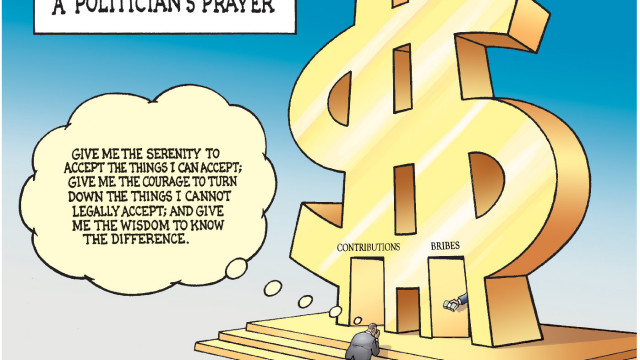For the past few years, people (particularly on the left) have been outraged at the notion of campaign contributions from individuals or companies to political candidates. This is an insult to democracy, they argue, because it gives the wealthy more of a voice!
Google used to contribute funds to help the Democratic Party in advancing their agenda of promoting same-sex marriage equality, easing immigration restrictions, and reducing environmental degradation. Recently, however, Google has allocated funds to some conservative groups despite some going against the company’s previously stated ideals. The Wall Street Journal reports:
Google also gave what it terms “substantial support” to other conservative and libertarian groups, including the Heritage Foundation, the American Enterprise Institute and Americans for Tax Reform. It gives the libertarian Cato Institute $480,000 worth of free web advertising annually, according to Cato. It gave the Federalist Society as much as $49,000 last year, the group said.
The backlash against the company on part of left-leaning activists has already started. One spokesman compared them to the Koch Brothers and their political activity.
What is interesting, however, is that before the WSJ broke this story, very few people were even talking about how much money Google, Microsoft, or any other company was contributing towards political campaigns. Their donations to the left-of-center groups or candidates were a complete non-issue! At least, no one seemed to care so much since there was far less fanfare from the press.
An article published yesterday by the New York Times looks at how the conservative minority in Hollywood organize themselves as a political organization with contributions for special interest. Despite the plethora of Democratic fund raisers and social calendar events, these minority conservative groups are getting extensive scrutiny by the press and the IRS! The report states:
The I.R.S. request comes in the face of a continuing congressional investigation into the agency’s reviews of political nonprofits, most of them conservative-leaning, which provoked outrage on the right and forced the departure last year of several high-ranking I.R.S. officials.
It is difficult for me to find specific instances of large contributions on part of wealthy liberals for their political cause because these instances are rarely covered, but do occur nonetheless. The reported instances of left-wing contributors are usually from non-partisan or independent institutes like OpenSecrets. Meanwhile, there is a whole wikipedia page spotlighting the entire political activities of the Koch Brothers, thorough coverage of right-wing fundraisers in the popular press, and even IRS scrutiny on part of the state.
Another recent article, again in the New York Times, applauded Hillary Clinton’s support from a major liberal Super-PAC. The article never even suggests the idea of campaign finance reform, which it often does when similar stories occur to right-of-center politicians.
According to a report by OpenSecrets, a non-partisan and non-profit public policy institute, the amount of money raised by both parties and their committees through campaign finance is roughly the same. If you delve deep into who their contributors, beneficiaries, industries, and recipients are, the results are nearly identical. Yet, why do we only report and cause fanfare for the type of campaign finance that we do not like?
Now I’m not necessarily defending the current campaign finance system in the U.S., my point with this entire post is to shed light on the fact that both parties are benefitting from private donors. In other words, if campaign finance reform were to actually happen, then both parties and activist groups will lose a once dependable source of income. With that being said, is it likely that campaign finance reform will change anything other than the public’s perception of the democratic process?

